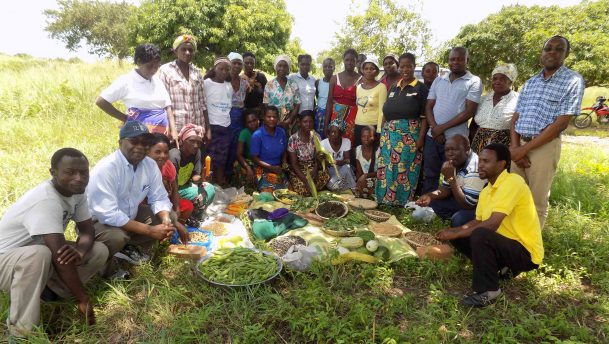Editor’s note: This story originally appeared in the Feed the Future newsletter. It highlights a partnership between the Zambia Alliance Against Hunger and Malnutrition and the Alliance to End Hunger, a sister organization of Bread for the World. The country of Zambia was featured in Bread’s 2016 Offering of Letters.
Muketoi Wamunyima has an agricultural development career in Zambia that stretches from government through the ranks of the nongovernmental organization Participatory Ecological Land Use Management (PELUM Zambia). This professional experience, combined with his own insights and determination, led Wamunyima to start a coalition to improve food security and nutrition in Zambia.
Historically, Zambia has been heavily focused on and invested in the copper industry. However, agriculture is another key economic driver—one that is fueled largely by smallholder farmers. Over 80 percent of agricultural activity in Zambia occurs on smallholder farms. And agriculture is important not only for economic reasons but also because Zambia struggles with high malnutrition rates, especially in rural areas.
In 2013, Wamunyima and PELUM Zambia formed the Zambia Alliance Against Hunger and Malnutrition (ZAAHM), a coalition of civil society organizations that works to promote, advocate and strengthen good practices and policies for the prevention and eradication of hunger and malnutrition.
In its first 2 years, ZAAHM brought together a coalition of 18 member organizations, but it had limited resources and capacity to advance its objectives. Despite these limitations, Feed the Future saw ZAAHM’s potential.
With connections facilitated through Feed the Future, ZAAHM was linked with the Alliance to End Hunger. Soon afterward, the two teamed up to increase ZAAHM’s membership and improve its capacity to influence policy. Wamunyima and the ZAAHM team achieved this goal by developing key organizational building blocks such as effective systems of governance; finance and human resource management; efficient program management; and enhanced skills and technologies for advocacy, policy analysis and communication.
Since partnering with Feed the Future, ZAAHM has increased its membership from 18 to 50 organizations. The coalition has also extended outreach to potential members in an increasing number of districts and has developed partnerships with other organizations and coalitions. Its engagement strategy now includes media outreach as well. These efforts are helping it to become more demographically and geographically diverse.
ZAAHM currently represents civil society in national policy processes. It actively participates in reviews of the National Agriculture Policy and the Zambia Land Policy, and proposes ways to enhance smallholder-farmer participation in development of the agriculture sector. It has increased its advocacy to help the coalition make unified proposals to the Farmer Input Support Program and budget processes—urging investment in agricultural diversification, varied diets and nutrition-sensitive development programs. What’s more, ZAAHM media outreach campaigns are getting information to the public on food production, input supply and prices, and climate news.
The Feed the Future Civil Society Action Plan reflects the need to strengthen existing platforms and alliances in order to harmonize and amplify the voice of local civil society, including rural populations, for food security and nutrition. Though still a fairly new coalition, ZAAHM has already made significant strides in becoming such a unified and influential voice, as well as an active and persuasive advocate for rural people.



